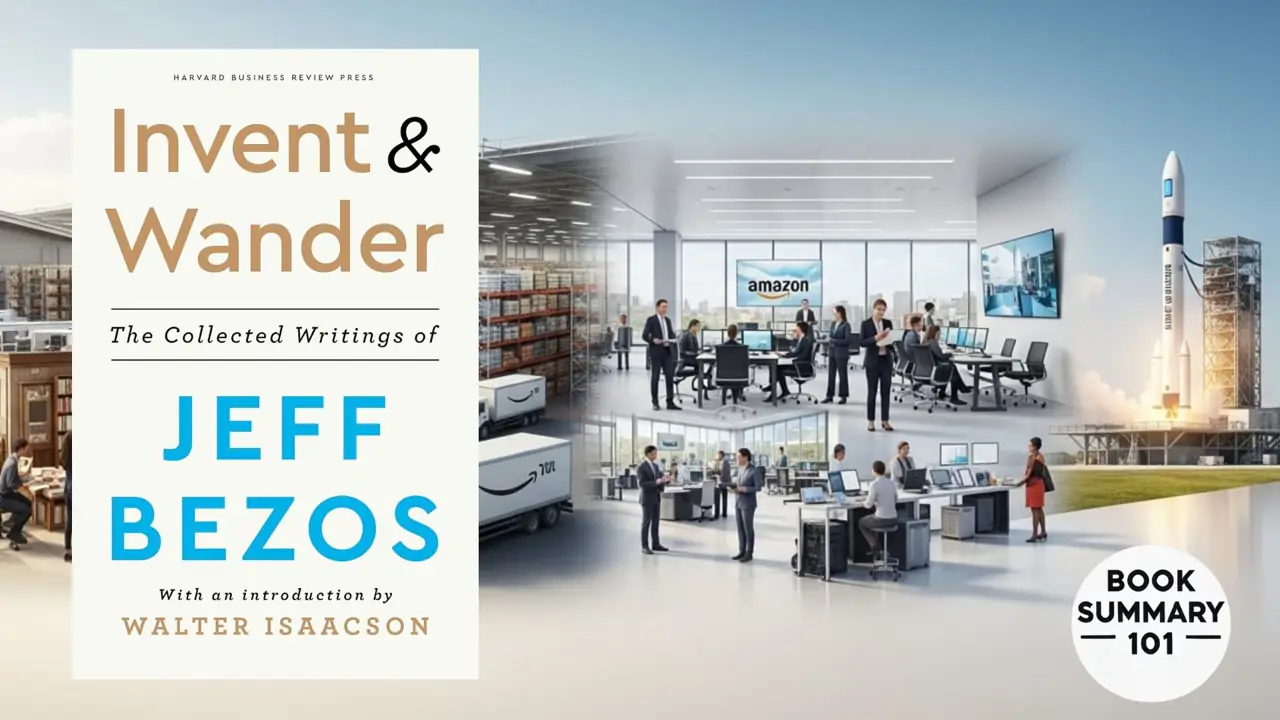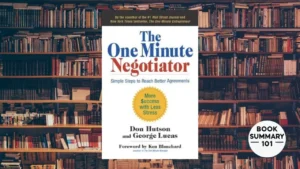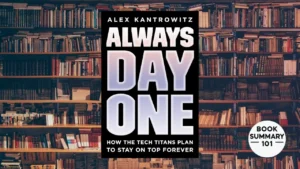This isn’t a traditional autobiography or biography. Instead, it’s a curated journey through Bezos’ thought processes over the years, with a focus on how he’s continually redefined what’s possible in the business world. Each piece reveals key insights into the strategies and principles that drove Amazon from a small online bookstore to a global powerhouse.
Walter Isaacson, a biographer known for his works on visionary leaders like Steve Jobs, provides a powerful introduction. He frames Bezos as a strategic thinker focused on customer obsession, long-term focus, and relentless experimentation. The book is divided into two main parts: Bezos’ annual letters to Amazon shareholders and a collection of interviews and speeches. Together, these capture the evolution of Amazon and the mind of one of the most influential leaders of our time.
Why Read This Book?
If you’ve ever wondered how Amazon became the behemoth it is today or wanted a peek into the mind that brought it to life, Invent and Wander offers that insight. But this isn’t just for entrepreneurs or business enthusiasts—it’s for anyone curious about big ideas, taking risks, and pushing boundaries. This collection brings together Jeff Bezos’ letters to shareholders, interviews, and speeches, all curated with an introduction by Walter Isaacson, giving us a front-row seat to Bezos’ philosophy on leadership, innovation, and the long game.
What Jeff Bezos Really Wants You to Know
Customer Obsession: The Foundation of Amazon’s Success
Bezos’ number-one rule is to be absolutely obsessed with customers—not competitors. Throughout Invent and Wander, Bezos emphasizes that customer-centric thinking shapes every Amazon decision. Instead of just monitoring competitor moves, Amazon asks, “What do our customers want today? What will they want tomorrow?” Bezos’ team dives into data, feedback, and trends to understand and anticipate needs that even customers may not realize yet.
One powerful example is Amazon Prime. When the company introduced free two-day shipping, it was a costly risk, but Bezos saw it as a crucial step to deepen loyalty and remove a key shopping barrier. Amazon’s relentless focus on convenience has led to other customer-centric initiatives, like one-click ordering, personalized recommendations, and 24/7 customer service. Bezos argues that this approach fosters an environment of trust and helps Amazon stay relevant even as trends and technologies shift.
Focus on Innovation, Not Just Efficiency: Embrace the “Wander” Part of the Journey
Bezos is clear that Amazon’s achievements come not just from streamlining operations, but from exploring new ideas and being unafraid to reinvent. This means encouraging innovation at all levels, and it’s something that makes Amazon unique. Bezos believes that while efficiency can optimize the present, true innovation requires wandering into unknown territories—experimenting with ideas that might seem unconventional or even risky.
Amazon Web Services (AWS) is a prime example of this. When Amazon first entered the cloud computing industry, many questioned whether an e-commerce company could succeed in a tech-heavy field. But Bezos saw an opportunity to leverage Amazon’s tech infrastructure for a whole new purpose. Today, AWS is one of Amazon’s most profitable ventures and a leader in cloud services, proving that staying curious and experimenting beyond the core business can yield massive results.
Risk and Failure Are Part of the Journey: Learning from Setbacks
Bezos doesn’t shy away from discussing failure, calling it an essential ingredient for innovation. In fact, he often reiterates that if Amazon isn’t failing often enough, it’s not taking big enough risks. He describes the company’s setbacks not as losses, but as opportunities to gain critical insights and pivot when necessary.
Take the Fire Phone, for instance. This smartphone was a big project with high expectations but failed in the market. However, instead of viewing this as a setback, Bezos treated it as a valuable learning experience. Lessons from the Fire Phone informed Amazon’s future product launches and influenced the development of Alexa and Echo devices, which went on to become major successes. For Bezos, calculated risk-taking and embracing failure are vital to driving breakthrough innovation.
Building for the Future: The Long-Term Thinking that Shapes Amazon
One of the most distinctive elements of Bezos’ philosophy is his long-term outlook. Bezos encourages Amazon employees to operate with a “Day One” mindset, as though they’re still a small startup, constantly striving to improve. This mindset fuels Amazon’s agility and willingness to make investments that might not pay off immediately but have the potential for huge impact.
This approach isn’t just talk—Bezos’ initiatives make it clear he’s planning far beyond the immediate future. His commitment to long-term thinking is evident in projects like Amazon Go stores, which experiment with cashierless technology, and in his personal investment in Blue Origin, his space exploration company. Bezos believes that space is the next frontier and that humanity needs to prepare for a future where Earth’s resources alone won’t sustain us. For Bezos, “Day One” thinking isn’t just about Amazon; it’s a philosophy of constant renewal and reinvention that extends to every project he takes on.
Operational Excellence: The Power of High Standards and Relentless Execution
Bezos is known for his extremely high standards, which he applies rigorously across Amazon’s teams and projects. In his view, setting high standards isn’t about perfectionism; it’s about inspiring teams to achieve more than they thought possible. Bezos believes that striving for excellence in every detail creates a ripple effect that improves every product, service, and interaction at Amazon.
His belief in operational excellence is evident in the evolution of Amazon’s logistics network. Building a distribution system capable of delivering millions of packages efficiently was no small feat, and it required Amazon to invent new tools, software, and systems to achieve world-class results. Bezos sees each step in the process as an opportunity to innovate, automate, and improve, transforming what could be routine tasks into powerful competitive advantages.
A Relentless Pursuit of the Future: The Vision to Change the World
Bezos doesn’t just want Amazon to be successful—he envisions Amazon reshaping the way people live and work. Bezos is driven by a vision of Amazon and Blue Origin as forces that can change entire industries and even impact the fate of humanity. Whether it’s streamlining online shopping, exploring artificial intelligence with Alexa, or planning for life beyond Earth, Bezos’ ambitions reach beyond profit margins to the broader human experience.
For Bezos, big problems and big questions are exciting opportunities. In Invent and Wander, he often talks about humanity’s potential, from renewable energy and sustainability to the future of space exploration. His ambitious ideas remind readers that thinking globally and beyond immediate constraints is not just for science fiction—it’s a mindset that encourages bold, transformative actions.
Bezos’ Lessons for Everyday Life
These takeaways aren’t just applicable to multi-billion-dollar companies; they can inspire anyone. Whether you’re building a business, managing a team, or planning your personal goals, Bezos’ focus on the customer, commitment to innovation, willingness to embrace failure, and long-term vision can provide guidance. This mindset of constant reinvention, setting high standards, and thinking globally might just be the keys to making your own dreams and ambitions a reality.
Invent and Wander isn’t just about Amazon—it’s a playbook for anyone looking to leave a lasting impact, wherever they are in life or work.
Real-Life Examples from Invent and Wander
Customer Obsession Above All
Bezos doesn’t just preach customer-centric thinking; he lives it. One example in the book is Amazon’s decision to offer free two-day shipping through Amazon Prime. While it was a huge financial risk, Bezos believed that a more convenient and reliable shopping experience would ultimately win customer loyalty. This gamble redefined online shopping and became a massive driver for Amazon’s success.
Embracing Failure and Learning from It
From the Fire Phone flop to Amazon’s expensive (but successful) foray into Web Services (AWS), Bezos shows how he uses setbacks as springboards for learning. The Fire Phone, for instance, didn’t gain traction and led to financial losses, but it helped Amazon hone its focus on tech hardware, which eventually led to the success of the Kindle and Echo devices.
The Power of a Long-Term Vision
One of the most striking insights is Bezos’ commitment to long-term thinking. He discusses his “Day One” philosophy, which encourages Amazon employees to keep innovating as if it’s the company’s first day in business. Bezos believes this mindset wards off complacency and fuels Amazon’s agility, even as it scales. For Bezos, a long-term focus means investing in ideas that may not pay off for years but could have a huge impact down the line.
Why Invent and Wander Matters Right Now
In an era where rapid changes are the norm, Bezos’ reflections on adaptability, customer focus, and the value of failure feel especially relevant. This book offers more than a glimpse into Amazon’s operations; it’s a masterclass on thinking big, planning for the long haul, and putting customers first.
Join the Conversation!
Invent and Wander provides fuel for discussions on leadership, innovation, and the evolving nature of business. Whether you’re an entrepreneur, a team leader, or simply someone curious about what makes Amazon tick, this book has something to offer.
Have you read Invent and Wander? What are your thoughts on Bezos’ strategies and principles? Or maybe you’re just intrigued by the idea of “Day One” thinking? Let’s chat in the comments!
5 powerful quotes from Invent and Wander
📖 “We are stubborn on vision. We are flexible on details.”
Bezos emphasizes the importance of having a clear, long-term vision while remaining adaptable in how you get there. The end goal should stay solid, but the path can change.
In simple terms: Know where you’re going, but don’t be afraid to adjust how you get there.
📖 “If you double the number of experiments you do per year, you’re going to double your inventiveness.”
This reflects Bezos’ belief that innovation is fueled by constant experimentation. More trials, even if some fail, mean more chances of finding breakthroughs.
In simple terms: The more you try, the more creative and successful you’ll become.
📖 “What’s dangerous is not to evolve.”
Bezos warns that companies (and people) who resist change risk becoming irrelevant. Progress requires adaptation.
In simple terms: If you don’t grow and change, you’ll get left behind.
📖 “Your brand is what other people say about you when you’re not in the room.”
Bezos redefines branding not as marketing slogans, but as reputation—the lived experience customers have with you.
In simple terms: Your reputation is your real brand, not your ads.
📖 “Day Two is stasis. Followed by irrelevance. Followed by excruciating, painful decline. Followed by death. And that is why it is always Day One.”
This is Bezos’ famous “Day One” philosophy: companies must always think like a startup to stay alive and innovative.
In simple terms: Always act hungry and fresh, or you’ll fade away.



